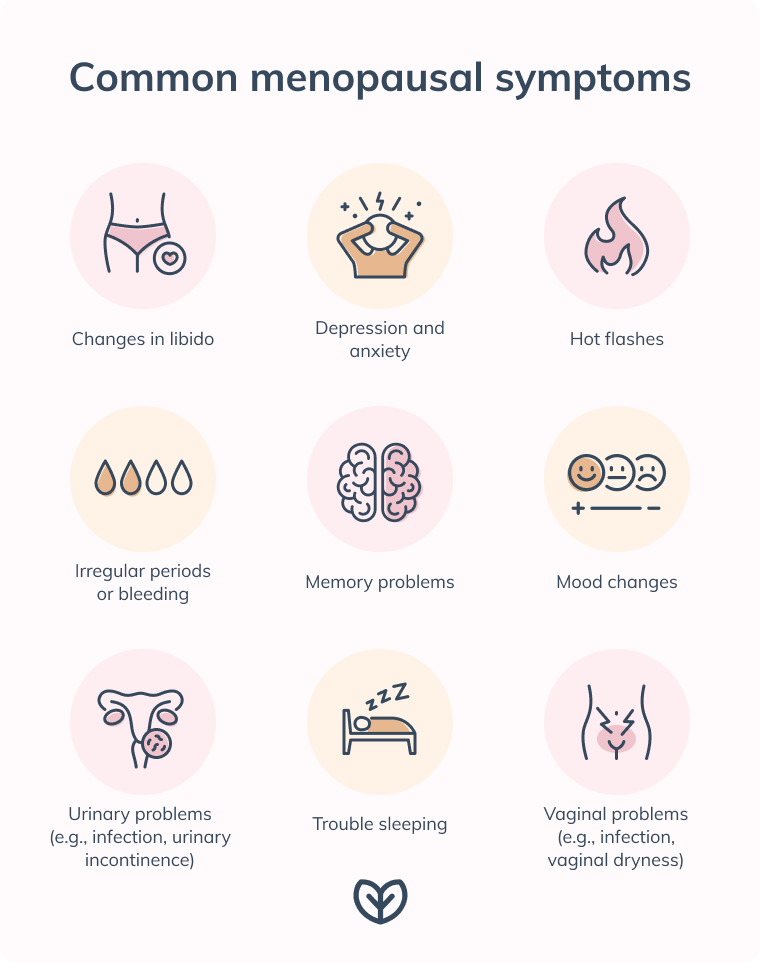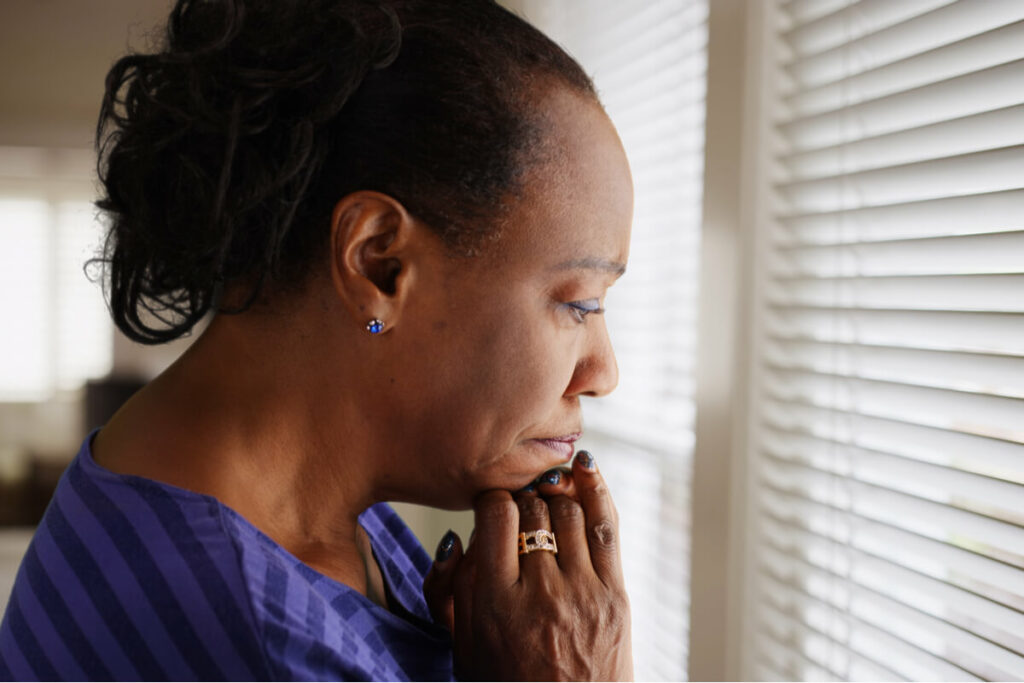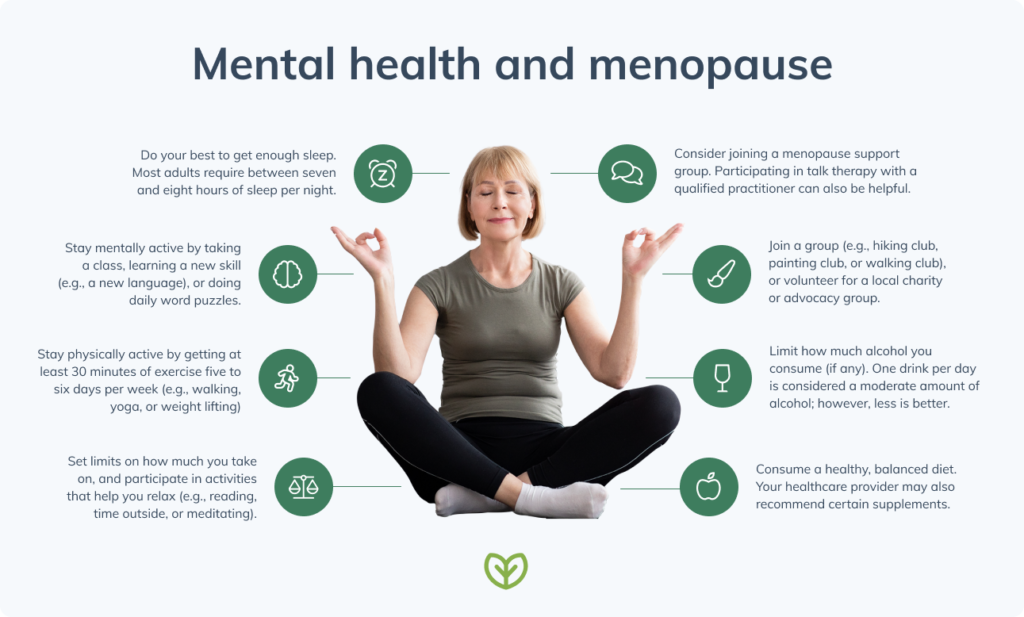Menopause is a natural transition that occurs during a menstruating person’s life marked by the end of menstruation. It is associated with different physical and emotional changes, and for some, these changes can affect the quality of their mental health. (16) Keep reading to learn more about the physical and emotional changes associated with menopause, and how to support your mental health during this important life stage.
What is menopause?
Menopause is a time in a menstruating person’s life when their menstrual cycle ends and their ovaries stop producing the hormones estrogen and progesterone. (14) Menopause officially occurs one year after a person experiences their last menstrual cycle. Once a person reaches menopause, they are no longer able to become pregnant. (16)
Perimenopause refers to the transition to menopause and a person’s last menstrual period. This transition can last two to eight years and usually begins during a menstruating person’s late forties. (16)

Menopausal symptoms
During perimenopause, menopause, and post-menopause, an individual’s hormone levels are changing, and both mental and physical changes may occur. (14)

Did you know? Menopausal hot flushes (or flashes) can be triggered by things like spicy food, alcohol, caffeine, a hot environment, or stress. Writing down and tracking your hot flushes helps to figure out what may trigger them for you, helping prevent them in the future. (20)
Menopause and mental health
During perimenopause, menopause, and post-menopause, people may experience for the first time or worsening mental health issues. The physical symptoms and hormonal shifts of menopause may lead to mood changes and negatively affect mental health. (7)(22)
Just like with physical health, it’s important to look after our mental health. Mental health refers to a state of well-being and can be characterized by factors such as:
- Enjoying life
- Coping well with stress
- Feeling connected to others
- Having a good sense of self
- Having a sense of purpose
- Having strong relationships (21)
Mental illness, which is distinct from mental health, refers to disturbances in feelings, thoughts, and perceptions that are serious enough to affect day-to-day functioning. Some examples of mental illnesses include schizophrenia, anxiety disorders, and mood disorders such as major depressive disorder. (21)
Depression and menopause
During perimenopause, individuals may be more vulnerable to depressive symptoms as a result of fluctuating hormone levels. Mood changes and physical changes such as hot flashes or trouble sleeping may also be associated with depressive symptoms. (5)(17)(18)
Depression (major depressive disorder), sometimes called clinical depression, is different from periodically feeling depressive symptoms. It’s a mood disorder that causes symptoms that regularly negatively impact how you feel and handle daily activities. Symptoms must persist for two or more weeks in order to be diagnosed as major depressive disorder. (6)
Depressive symptoms and symptoms of depression may include:
- Appetite and/or weight changes
- Difficulty sleeping, or oversleeping
- Fatigue
- Guilt or worthlessness
- Hopelessness or pessimism
- Loss of interest or pleasure in hobbies and activities
- Sad, anxious, or “empty” mood (6)

A meta-analysis study compared the risk of clinical depression and depressive symptom severity during perimenopause to pre-menopause. Results demonstrated that perimenopausal women do not have a greater risk than pre-menopausal women in developping depression. However, perimenopausal women were more likely to experience depressive symptoms with greater severity than pre-menopausal women. There is also a relationship between vasomotor symptoms (e.g., night sweats, hot flashes) and depressive symptoms during perimenopause. This research suggests that women may be more vulnerable to depressive symptoms during perimenopause than before menopause. (5)
Did you know? In the United States, symptoms of depression, hot flashes, and sleep disturbances are more severe in black individuals than white individuals, but they are less likely to receive medical and mental health services. (11)
Anxiety and menopause
Individuals may experience physical and emotional symptoms of anxiety throughout the stages of menopause. (2)(3)(10)
Anxiety disorders are characterized by feelings of fear or distress that are out of proportion with the situation, seriously impacting an individual’s behavior, thoughts, and physical and emotional health. Many people, however, may feel anxious (e.g., nervousness, tension, breathlessness, chest pain) in response to a real event and do not have an anxiety disorder. (12)
A longitudinal study examined the risk of anxiety in women between the ages of 42 to 52 over a ten-year period. Symptoms of irritability, feeling fearful for no reason, tension or nervousness, and a racing or pounding heart were used to measure anxiety scores. Results demonstrated that women with low levels anxiety at baseline (before perimenopause) were more likely to report high levels of anxiety symptoms during perimenopause and post-menopause. Women with high levels of anxiety at baseline (befor perimenopause) continued to experiencee high levels of anxiety throughout the different stages of menopause, however, they did not experiene an increase in their levels. This research suggests that pre-menopausal women with low levels of anxiety are more likely to experience an increase in anxiety levels during and after menopause than pre-menopausal women with high levels of anxiety. (2)
Did you know? Individuals who experience high levels of anxiety before perimenopause are more likely to experience hot flashes during perimenopause. (9)(10)
Cognitive function and menopause
During the transition to menopause and post-menopause, individuals may experience changes in cognitive function. (19)(23)(24)
One study examined differences in cognitive function during the different stages of reproductive age. Results demonstrated that women in their first year post-menopause performed significantly worse in certain areas of cognition (i.e., verbal learning, verbal memory, motor function, working memory tasks) compared to women in late reproductive age and perimenopause. These results suggest that decreases in certain areas of cognitive function may be most noticeable in the first year after menopause. (24)
Another study examined women’s perception of their memory across the menopausal transition. Women were divided into groups based on their stage of menopause and asked to self-evaluate different symptoms. Results demonstrated no impairment in neuro-physical performance (memory and executive function); however, compared to pre-and post-menopausal women, women in perimenopause were more disatisfied with their memory, reporting significantly more forgetfulness. (23)
How to feel your best during menopause
Feeling your best during perimenopause and menopause will look different for each person depending on their needs and interests. Consider some of the following methods to help maintain strong mental health during and after the menopausal transition.

Hormone replacement therapy
Menopausal hormone therapy (MHT), or hormone replacement therapy (HRT), is a treatment that involves taking hormones similar to estrogen and progesterone as tablets, gels, patches, or vaginal treatments. (25) A healthcare provider might prescribe MHT to a menopausal person to address different biological changes that have occurred during menopause due to declining progesterone and estrogen levels (e.g., bone loss). (13)(15)
Always speak with your healthcare provider before considering menopausal hormone therapy. MHT is associated with an increased risk of different health effects such as:
- Breast cancer
- Dementia
- Hip and vertebral fractures
- Stroke, blood clots, and heart attack
- Urinary incontinence
- Vaginal bleeding (13)
Bioidentical hormone replacement therapy (BHRT), distinct from MHT and HRT, is defined by the American endocrine society as compounds that have the exact molecular structure of hormones produced by the human body. (4) However, the term bioidentical hormone does not have a standard definition, and BHRT compounds can vary depending on their source, materials, and manufacturing methods. BHRT can be prescribed by a qualified healthcare provider to address biological changes that occur during menopause due to declining hormone levels. (8) BHRT compounds should always be approved by your healthcare provider and local government’s drug administration before use. (1)
The bottom line
Menopause is a natural transition in a menstruating person’s life when their menstrual cycle ends and their ovaries stop producing the hormones estrogen and progesterone. Individuals may experience changes in cognitive function and feelings of depression and anxiety at different stages of menopause. Getting adequate sleep; staying socially, mentally and physically active; reducing stress; participating in talk therapy; limiting alcohol; and consuming a healthy diet may help support strong mental health during menopause.
- Bioidentical hormone therapy – Menopause and U. (n.d.). The Society of Obstetricians and Gynaecologists of Canada (SOGC). https://www.menopauseandu.ca/therapies/bioidentical-hormone-therapy/
- Bromberger, J. T., Kravitz, H. M., Chang, Y., Randolph, J. F., Avis, N. E., Gold, E. B., & Matthews, K. A. (2013). Does risk for anxiety increase during the menopausal transition? Study of women’s health across the nation. Menopause, 20(5), 488–495.
- Bryant, C., Judd, F. K., & Hickey, M. (2012). Anxiety during the menopausal transition: A systematic review. Journal of Affective Disorders, 139(2), 141–148.
- Compounded bioidentical hormone therapy. (2019, October 24). Endocrine Society. https://www.endocrine.org/advocacy/position-statements/compounded-bioidentical-hormone-therapy
- de Kruif, M., Spijker, A., & Molendijk, M. (2016). Depression during the perimenopause: A meta-analysis. Journal of Affective Disorders, 206, 174–180.
- Depression. (2018). National Institute of Mental Health. https://www.nimh.nih.gov/health/topics/depression
- Dotlic, J., Radovanovic, S., Rancic, B., Milosevic, B., Nicevic, S., Kurtagic, I., Markovic, N., & Gazibara, T. (2020). Mental health aspect of quality of life in the menopausal transition. Journal of Psychosomatic Obstetrics & Gynecology, 42(1), 40–49.
- Files, J. A., Ko, M. G., & Pruthi, S. (2011). Bioidentical hormone therapy. Mayo Clinic Proceedings, 86(7), 673–680.
- Freeman, E. W., & Sammel, M. D. (2016). Anxiety as a risk factor for menopausal hot flashes: Evidence from the penn ovarian aging cohort. Menopause, 23(9), 942–949.
- Freeman, E. W., Sammel, M. D., Lin, H., Gracia, C. R., Kapoor, S., & Ferdousi, T. (2005). The role of anxiety and hormonal changes in menopausal hot flashes. Menopause, 12(3), 258–266.
- Harlow, S. D. (2022). Disparities in reproductive aging and midlife health between black and white women: The study of women’s health across the nation (SWAN) – women’s midlife health. BioMed Central. https://womensmidlifehealthjournal.biomedcentral.com/articles/10.1186/s40695-022-00073-y
- Health Canada. (2009). Mental health – anxiety disorders – Canada.ca. Government of Canada. https://www.canada.ca/en/health-canada/services/healthy-living/your-health/diseases/mental-health-anxiety-disorders.html
- Menopausal hormone therapy and cancer. (2018). National Cancer Institute. https://www.cancer.gov/about-cancer/causes-prevention/risk/hormones/mht-fact-sheet
- Menopause. (2016). MedlinePlus. https://medlineplus.gov/menopause.html
- Menopause. (2019). U.S. Food and Drug Administration. https://www.fda.gov/consumers/womens-health-topics/menopause
- Menopause | office on women’s health. (2019). US Department of Health & Human Services. https://www.womenshealth.gov/menopause
- Menopause & depression, mood changes. (n.d.). The North American Menopause Society. https://menopause.org/patient-education/menopause-topics/mental-health
- MGH Center for Women’s Mental Health. (2018, May 30). Menopausal symptoms. MGH Center for Women’s Mental Health. https://womensmentalhealth.org/specialty-clinics/menopausal-symptoms/
- Mosconi, L., Berti, V., Quinn, C., McHugh, P., Petrongolo, G., Varsavsky, I., Osorio, R. S., Pupi, A., Vallabhajosula, S., Isaacson, R. S., de Leon, M. J., & Brinton, R. D. (2017). Sex differences in alzheimer risk. Neurology, 89(13), 1382–1390.
- Office on Women’s Health. (2018). Menopause symptoms and relief. US Department of Health & Human Services. https://www.womenshealth.gov/menopause/menopause-symptoms-and-relief
- S. (2021). Mental health: What is it, really? CMHA National. https://cmha.ca/find-info/mental-health/general-info/
- Sajatovic, M., Rosenthal, M. B., Plax, M. S., Meyer, M. L., & Bingham, C. R. (2003). Mental illness and menopause: A patient and family perspective. J Gend Specif Med, 6(2), 31–40.
- Unkenstein, A. E., Bryant, C. A., Judd, F. K., Ong, B., & Kinsella, G. J. (2016). Understanding women’s experience of memory over the menopausal transition: Subjective and objective memory in pre-, peri-, and postmenopausal women. Menopause, 23(12), 1319–1329.
- Weber, M. T., Rubin, L. H., & Maki, P. M. (2013). Cognition in perimenopause. Menopause, 20(5), 511–517.
- What is menopausal hormone therapy (MHT) and is it safe? (2019). Australasian Menopause Society. https://www.menopause.org.au/health-info/fact-sheets/what-is-menopausal-hormone-therapy-mht-and-is-it-safe





